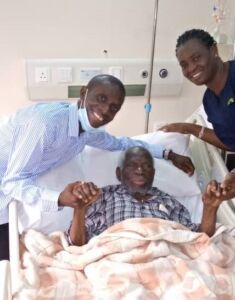When you take the right steps at the right time, even the toughest challenges can be overcome. That’s the source of hope and what drives Dr. Charles Adeogun, a doctor running outreach programs for patients and their families across his native Nigeria to help them live longer, better and happier. And he’s the sort of special person we all need to meet and be inspired by.
Many reading this will be living in a part of the world with relatively easy access to healthcare services. Yet it’s a very different picture in Nigeria – even if great strides in healthcare have been made over the years.
But how do you properly address the health of a developing nation of 200 million people? In an environment where the resources needed for quality healthcare are often only available to a small part of society? And, as a practitioner without a comprehensive national healthcare system to support you, how do you overcome the many obstacles between you and the patient outcomes you’re working towards?

Often, it’s about bringing healthcare directly to the patients.
A different approach makes the difference
When simply getting more money isn’t an option, it takes new approaches. And it takes special people who are committed to doing what is needed for patients and their families.
When you meet Dr Charles Adeogun for the first time and start hearing about his work, you quickly realise that he’s one of these special people. His personal qualities come across immediately. Like his wide clinical knowledge. His awe-inspiring passion for his work. His can-do (and must-do) attitude. But, if there’s one thing you feel more than anything else, it’s his love of life. From his huge optimism and ready smile to his deep empathy for his patients and their families. Because, for him, it’s all about life – and preventing the suffering that shatters lives or cuts them short.

Helping patients access quality healthcare when they need it.
A health and social challenge
And this is why the monitoring and treatment of sickle cell anemia is particularly close to his heart as a Nigerian. “Nigeria is often referred to as the epicentre of the disease,” explains Charles. “And we have almost 150,000 children born every year with the sickle cell diagnosis. Most will die before the age of 30. Although we have some that live into their 60s and 70s … those at the top of society who have access to quality healthcare.” Charles continues: “It’s just sad. When people have babies with this diagnosis, they say, ‘Oh this baby isn’t going to live long.’”
In addition to cutting lives short, the quality of life for sufferers can be very poor. From the stigma of being weak and the family being “cursed” that restricts people’s opportunities to develop, form relationships and have children. To the multiple comorbidities such as the danger of sepsis or complications from infections like malaria. And all the while, severe pain episodes that are almost impossible to imagine. Charles still tries to give an idea: “A woman came to me and she said the pain of labour was minor compared to this …”

Church groups are a good way to promote health awareness.
Finding the way forward
The obvious answer for many sickle cell sufferers would be quality healthcare and medication to manage the condition, alleviating the painful symptoms and minimizing the associated risks. However, that is not an easy or affordable option for the majority of Charles’s patients. He had to find another approach – a combination of health education and close monitoring where hematology analysis plays a vital role.
The all-important first step is good health education that can prevent a lot of problems down the line. For sickle cell patients and their families, it’s about raising awareness of potential triggers like stress, poor nutrition, hygiene and hydration. “When it comes to health education on the condition, there is a lot of room for improvement,” says Charles. “One of the key preventive measures, for example, is ensuring a clean and supportive family environment.”
The sooner, the better
At the same time, science lends a much-needed helping hand. Close monitoring of the condition gives early warning of these triggers and impending crises, and the need to intervene with, for example, a blood transfusion. Charles is clear about the importance of hematology analysis and complete blood counts in making a massive difference in his patients’ lives: “We look at everything – the hematocrit, leukocytes, neutrophils, platelets … ,” says Charles. “Hematology analysis is the bedrock of our successful monitoring.”
Early detection and prevention of the worst effects of the condition is what makes all the difference. And it’s an approach that not only brings hope and encouragement to sickle cell patients and their families but also to healthcare professionals like Charles who are working hard to put patients on this path to a better, happier future.
We wish Charles all success in the future. And we look forward to following up on his latest venture that is currently in its planning stage: a mobile phone-based consultation platform that will do even more to connect doctors and nurses with sickle cell and other patients throughout Nigeria. Because, as Charles proves every day, the more you reach out, the more lives you touch.





